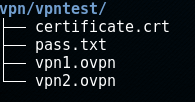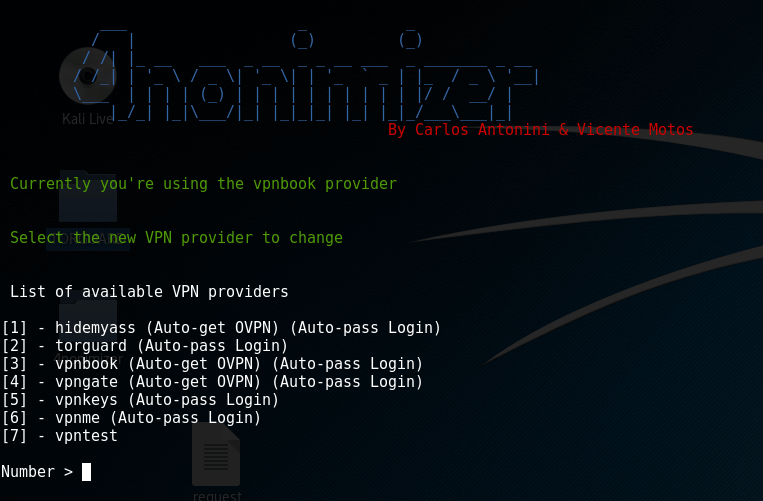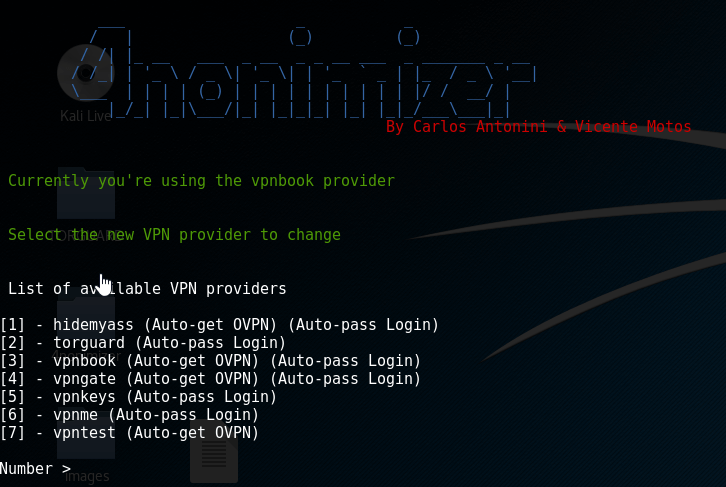4nonimizer is a bash script for anonymizing the public IP used to browsing Internet, managing the connection to TOR network and to different VPNs providers (OpenVPN), whether free or paid. By default, it includes several pre-configured VPN connections to different peers (.ovpn files) and download the credentials (if the corresponding provider support it). Also, it records each used IP that we use every 300 seconds in log files.
This script is enabled as a service in systemd systems and uses a default vpn (VPNBook) at system startup.
Since version 1.06 the dns resolution requests are done throught DnsCrypt (enable and disable with option enable_dns or disable_dns)
Since version 1.12 the logs of connections vpn saved in sqlite in /logs/
Also ReadPhishing Frenzy – Ruby on Rails Phishing Framework
4nonimizer Installation
Download the repo using git, execute the command ./4nonimizer install in the directory, and follow the screen instructions, 4nonimizer will move to the directory /opt/ and installed as a service.
This script has full compatibility with Kali Linux, although it has been properly tested and should also work on other distributions like Debian, Ubuntu and Arch (Manjaro). However there could be some bugs, or unexpected performances (please comments if you find any!).
Options
Once installed 4nonymizer, enter the command 4nonimizer help to get the help, which shows all the available parameters:
___ _ _
/ | (_) (_)
/ /| |_ __ ___ _ __ _ _ __ ___ _ _______ _ __
/ /_| | '_ \ / _ \| '_ \| | '_ ` _ | |_ / _ \ '__|
\___ | | | | (_) | | | | | | | | | | |/ / __/ |
|_/_| |_|\___/|_| |_|_|_| |_| |_|_/___\___|_|
By Carlos Antonini & Vicente Motos
Version: 1.06-beta
Usage: 4nonymizer <parameter>
install: Install the script in run services
uninstall: Disable run service and remove app directory
change_provider: Change VPN Provider
change_ip: Change IP from VPN current
vpn_status: Check IP and provider VPN running
update_vpns: Update all ovpn of VPNs
start: Init the 4nonimizer service
stop: Stop the 4nonimizer service
stop_nonet: Stop the 4nonimizer service and shutdown network interfaces
restart: Restart the 4nonimizer service
update_app: Update this program via git
privoxy: Install and configure privoxy with port 8118 (BETA)
proxychains4: Install and configure proxychains4 for default in the system
browser: Fire up a firefox browser with profile privoxy -> tor
test_availability: Check peers availability and delete ovpn file if the IP/service is unreachable
location: Now you can select a specific country or continent of the vpn peer
enableboot: You can enable service in boot
disableboot: You can disable service in boot
enable_dnscrypt: Enable dnscrypt service
disable_dnscrypt: Disable dnscrypt service
help: Help (this screen)
Available VPNs
Currently it supports the following VPN providers:
- 7Proxies
- AirVPN
- Cryptostorm
- Cyberghost
- ExpressVPN
- FreeVPN
- HideMyAss
- IpPVanish
- NordVPN
- PIA
- ProntonVPN
- Proxy.sh
- SlickVPN
- StrongVPN
- TorGuard
- TunnelBear
- VPNBook
- VPNGate
- VPNKeys
- VPNMe
- Vyprvpn
Install A New VPN
To install an additional vpn we have to use the following structure in order to the 4nonimizer be able to integrate and perform operations with it.
First, we have to create the following dir structure /vpn/ within 4nonimizer path:

In our example we create the folder /vpntest/ and within it placed all .ovpn files we have. If the files ovpn not have the certificate within each of them we put in the same folder as shown in the example certificate.crt.
In addition, we must place a file named pass.txt containing 2 lines: the first one with the username and the second one with the password, as shown below:

If we have correctly performed all steps when we execute the command 4nonimizer change_provider the menu will show our vpn:

As you can see in the picture, option [7] it is the vpn we’ve created.
Getting Credencials & ovpn Files Automatically
If the VPN provider allows automation of credential and/or .ovpn files getting, 4nonimizer has standardized the following scripts names and locations:
– /opt/4nonimizer/vpn/provider/vpn-get-pass.sh

– /opt/4nonimizer/vpn/provider/vpn-get-ovpn.sh

4nonimizer automatically detect the presence of both scripts and indicate (Auto-pass Login) or (Auto-get OVPN) if it finds in the first line of each file the expression ‘#4uto’ or ‘#m4nual’ depending on the performed actions.

Additional
– Execute ‘source 4nonimizer’ to activate autocompletation of parameters.
– Copy .conkyrc in your home directory to load a 4nonimizer template and execute conky.








